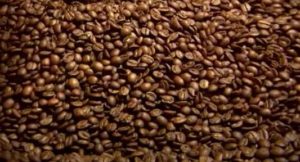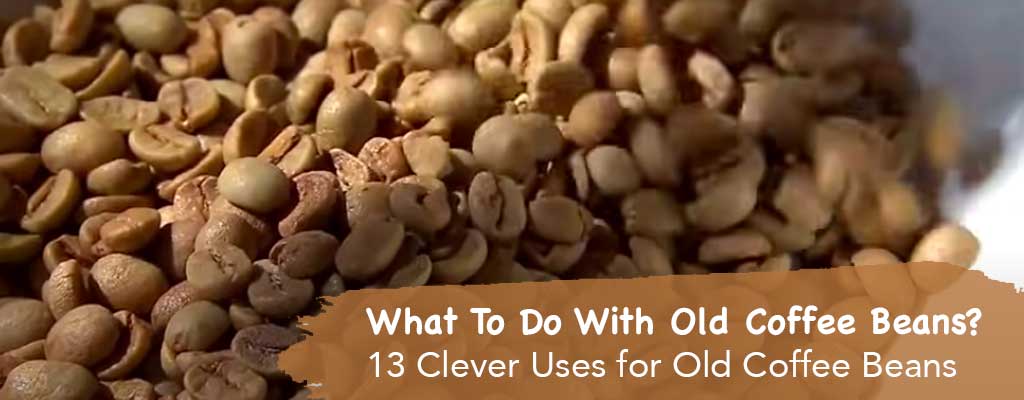What to do with old coffee beans? We can always repurpose them rather than just throwing them away. What’s more, it could even be fun. Old coffee beans can be used as a fertilizer in your garden or compost heap – the nitrogen and phosphorous they provide are excellent natural fertilizers for your plants.
Alternatively they can also be used to deter pests such as ants and slugs from your garden; simply sprinkle the beans around any vulnerable plants. If that’s not to your taste you can take advantage of their aromas virtue and use them to freshen up items like carpets, furniture and clothes.
Last but not least why not put those old beans back into action? Use them as potpourri or grind down the beans for fresh-tasting homemade espresso so you never have an excuse for missing that early morning caffeine hit again!
What Can You Do With Old Coffee Beans?

Coffee grounds are a great source of nitrogen, potassium and phosphorus, all vital nutrients for healthy plant growth. Sprinkle the grounds around your plants or mix them directly into your soil to give your garden an extra boost of nutrients.
1. Create Compostable Garden Fertilizer:
Adding coffee grounds to your compost heap is a great way to enrich the soil of your garden. Coffee beans are rich in nitrogen, making them an excellent source of organic fertilizer for plants.
2. Protect Your Plants:
You can use used coffee grounds to ward off pests from eating away at your garden plants. Sprinkle some dry coffee grounds around the base of the plant and it will act as a natural repellent to keep away any bugs or insects.
3. Make Homemade Exfoliants:
Coffee grounds make for an excellent scrubbing agent when combined with other ingredients like honey, coconut oil, and sugar. The coarse texture of coffee grounds is perfect for sloughing off dead skin cells, leaving your skin feeling soft and refreshed.
4. Deodorize Your Refrigerator:
Place an open container of ground coffee beans in the back corner of your fridge to help absorb any unpleasant odors. You will be amazed at how much fresher your food and drinks will taste with this simple hack.
5. Enhance the Flavor of Dishes:
Sprinkle a pinch of coffee grounds onto your favorite dishes for an extra kick of flavor and aroma. The subtle hint of coffee can be a great addition to dishes like stews, sauces, and even desserts!
6. Freshen Up Your Carpets:
Sprinkle a thin layer of ground coffee beans on carpets and rugs to help neutralize any bad odors. Leave it for about 10 minutes before vacuuming up the grounds for a fresh-smelling home.
7. Make Natural Colored Dyes:
You can use used coffee beans to create natural dyes for fabrics, paper, and other crafts. Simply boil a pot of used coffee grounds and steep them overnight to create a beautiful shade of brownish-black.
8. Feed The Wildlife:
Sprinkling your old coffee beans in the garden is an excellent way to attract wild birds and animals into your backyard. Coffee beans are also very nutritious for small mammals like squirrels, chipmunks, and rabbits.
9. Facial Mask:
Mix equal parts of ground coffee beans with honey and apply it to your face as a natural exfoliant. Leave it on for 5 minutes and rinse off with cold water for soft and supple skin.
10. Aroma Therapy:
Lightly simmer some used coffee beans in a pot of water to create an invigorating and stimulating aroma. This is great for calming the mind, reducing stress levels, and promoting better sleep.
11. Make a DIY exfoliant – Ground coffee beans make an excellent natural exfoliant.
Mix a few tablespoons of the grounds with olive oil or coconut oil and apply it directly to your skin in circular motions. Rinse well after use for softer, smoother skin.
12. Compost them
Coffee grounds make an excellent addition to any compost pile. The nitrogen helps promote beneficial microbes while the porous nature helps keep oxygen in the compost pile.
13. Repel pests
Coffee grounds can be used to repel ants, snails, slugs and other garden pests. Sprinkle them around the perimeter of your garden or mix them directly into the soil for maximum effectiveness.
These are just a few ways that you can put your old coffee beans to good use! With these tips, you’ll never have to worry about what to do with your used coffee grounds again! You can also add oil to the mix, such as olive or coconut oil, for extra nutrients – giving your garden an extra boost of nourishment.
What do old Coffee Beans Taste Like?
Old coffee beans typically have a weaker flavor than freshly roasted beans due to the loss of volatile compounds over time. The taste can range from slightly sweet and nutty to bitter and acidic, depending on how long they’ve been stored. Old coffee beans are generally not recommended for drinking, but they can still be used in various recipes or as a natural fertilizer.
The best way to avoid the bitter taste of old coffee beans is to store them properly and use them within two weeks of roasting. After that, their flavor may start to deteriorate due to oxidation and other factors. If you must keep them longer, it’s recommended to freeze or vacuum-seal them to preserve their freshness.
When freezing coffee beans, it’s important to note that they may expand when thawed so it’s best to keep them in an airtight container. If you do decide to consume old coffee beans for their flavor, be sure to taste a small amount first before drinking more of it. While old coffee beans may not taste great, they can still be used in various recipes or as a natural fertilizer.
Related article:
How does a Keurig work?
What to do with old coffee beans in the garden?
Old coffee beans can make a great addition to the garden. They contain high levels of nitrogen, potassium, and phosphorus which are essential for healthy plant growth. Coffee grounds can also help improve soil structure by improving aeration and drainage as well as providing vital micronutrients.
Coffee grounds can be used directly on the soil as a fertilizer or mixed into compost for an extra boost. They can also be used to help deter pests such as slugs, snails, and ants by sprinkling them around the perimeter of your garden.
Do old coffee beans lose caffeine?
Yes, old coffee beans do lose caffeine over time. Caffeine is a volatile compound which begins to degrade after the beans have been roasted. The rate of degradation depends on several factors such as heat, light, and air exposure. Generally speaking, older beans will have less caffeine than freshly roasted ones but they can still provide some benefits depending on how you use them.
Old coffee beans still good?
Yes, old coffee beans are still good for various uses. While they may not taste great when used for drinking, they can still be used in recipes or as a natural fertilizer. They contain high levels of nitrogen, potassium, and phosphorus which make them perfect for use in the garden and compost piles.
Additionally, if stored properly, old coffee beans can provide some level of caffeine and may be used in recipes or drinks. So go ahead and start repurposing those old coffee beans today! With these tips, you’ll never have to worry about what to do with your used coffee grounds again.
Old Coffee Beans Uses?
Old coffee beans can be used for several different applications. They can be used as a fertilizer, either directly on soil or mixed into compost for an extra boost of nutrition. They can also help deter pests by sprinkling them around the perimeter of your garden.
What is gold coffee beans?
Gold coffee beans are simply freshly roasted coffee beans that have been glazed with a thin layer of edible gold dust. Gold coffee beans are often used to create unique and luxurious looking cups of coffee, adding a touch of luxury to the experience.
The gold coating will not affect the taste or aroma of the beans but can add some visual appeal. Gold coffee beans are typically more expensive than regular coffee beans and should be stored carefully to ensure maximum freshness.
Gold coffee beans can also be used in other culinary applications, such as decorating cakes or cookies. The gold dust will add a slight shimmer to the finished product and provide it with a unique visual appeal.
FAQs
Q: How long can I store coffee beans?
A: Coffee beans should be stored in an airtight container and consumed within 2-3 weeks of roasting for optimal flavor and freshness. If you must keep them longer, it’s recommended to freeze or vacuum-seal the beans for extended storage.
Q: What happens if I drink old coffee beans?
A: Old coffee beans will likely not taste great and may be slightly sour or bitter. However, they are still safe to consume in small amounts. Be sure to taste a small amount first before drinking more of it.
Q: Can I use old coffee beans as fertilizer?
A: Yes, old coffee beans can be used as a fertilizer in the garden. They contain high levels of nitrogen, potassium, and phosphorus which are essential for healthy plant growth. Coffee grounds can also help improve soil structure by improving aeration and drainage as well as providing vital micronutrients.
Q: What is the difference between regular and gold coffee beans?
A: Regular coffee beans are simply freshly roasted beans, while gold coffee beans have been glazed with a thin layer of edible gold dust. The gold coating does not affect the flavor or aroma of the beans but can add some visual appeal. Gold coffee beans are typically more expensive than regular coffee beans and should be stored carefully to ensure maximum freshness.
Q: How can I get the most out of my coffee beans?
A: To get the most out of your coffee beans, it’s recommended to store them in an airtight container and consume within 2-3 weeks of roasting, using a burr grinder to grind the beans just before brewing and using filtered water for optimum flavor.
Q: Can you use 2 year old coffee beans?
A: While most coffee experts recommend consuming beans within 2-3 weeks of roasting for optimal flavor, old beans can still be used in recipes or as a natural fertilizer. However, they may not taste great when brewed and should be tested before drinking. It is also important to note that the caffeine content of old beans may not be as potent. It is best to discard any beans that are more than two years old.
Q: What can expired coffee be used for?
A: Expired coffee can still be used for a variety of purposes. It can be mixed into compost or used as a natural fertilizer in the garden. It can also be used to make homemade air fresheners, body scrubs, and face masks. Old coffee grounds can even be used to clean dishes or polish silverware.
Q: Can I use expired coffee beans?
A: Expired coffee beans may still be safe to consume in small amounts, but they likely won’t taste great. It is best to test a small amount first before drinking more of it. Expired beans can also be used for non-culinary purposes such as composting, natural fertilizer for your garden, or even cleaning dishes. Q: Should I throw away expired coffee?
A: If your coffee has been stored improperly or is more than two years old, it’s best to throw it away. If you still want to use the expired beans for non-culinary purposes, such as composting or cleaning dishes, you can do so but be aware that the caffeine content may not be as potent.
Q: How can you tell if coffee beans are bad?
A: One way to tell if coffee beans are bad is by tasting a small amount. Bad beans will usually have a sour or bitter taste and may also give off an unpleasant smell. You can also check the color of the beans—if they appear discolored, there’s a good chance that they’re no longer fresh.
Q: How long will coffee beans last?
A: Coffee beans will stay fresh for up to 2-3 weeks after roasting if stored in an airtight container away from heat and light. After this time, the beans may still be safe to consume but may not have as much flavor or aroma. It is best to discard any beans that are more than two years old.
Q: Should you refrigerate coffee beans?
A: It is not recommended to refrigerate coffee beans, as the cold temperature and humidity can cause condensation which can lead to mold growth on the beans. Instead, store in an airtight container away from heat and light for optimal freshness.
Q: How long do coffee beans last once opened?
A: Coffee beans should be consumed within 2-3 weeks of opening the package for optimal flavor and aroma. If you find that the beans are not tasting as fresh after this time, it is best to discard them. Storing in an airtight container away from heat and light will help preserve freshness.
Q: Why you shouldn’t freeze coffee?
A: Freezing coffee beans can significantly reduce the flavor, aroma, and texture of the beans. This is because the cold temperature will slow down the natural aging process of the beans, which is necessary for optimal flavor.
Q: Is it OK to freeze coffee beans?
A: Many coffee experts recommend against freezing coffee beans, as the cold temperature will slow down the natural aging process of the beans and reduce its flavor, aroma, and texture. Instead, store in an airtight container away from heat and light for optimal freshness. It is best to discard any beans that are more than two years old. If you must freeze the beans, be sure to use within three months of freezing.
Q: What is the best way to preserve coffee beans?
A: The best way to preserve coffee beans is to store them in an airtight container away from heat and light. This will help keep the beans fresh for up to 2-3 weeks after roasting. It is also important to follow the expiration date indicated on the package and discard any beans that are more than two years old.
Q: Does freezing coffee beans ruin the flavor?
A: Yes, freezing coffee beans can significantly reduce the flavor, aroma and texture of the beans. This is because the cold temperature will slow down the natural aging process of the beans, which is necessary for optimal flavor.
Q: How do you store coffee beans for 6 months?
A: It is not recommended to store coffee beans for longer than 3 weeks as the flavor, aroma and texture of the beans will start to diminish. If you must store them for 6 months or longer, be sure to keep the beans in an airtight container away from heat and light.
Conclusion
Ultimately, whatever you decide to do with your old coffee beans, the main takeaway should be that the key to a better-tasting and more flavorful cup of coffee is to start with fresh beans. By taking some time to analyze and choose quality beans, you can ensure that the end result is something special and enjoyable.
Additionally, understanding storage and disposal options for used beans can help prevent unnecessary wastage of resources or contamination by pests or microorganisms.
Keeping these possibilities in mind will help you get the most out of every cup of coffee. With these insights in mind, now is a great time to find yourself a great tasting bean from your local store or online supplier! With that being said, professional baristas often have access to resources that laymen may not—so reach out if you need assistance deciding which type of bean to purchase on your next order.
I’m Jeff Olson, and I love coffee. In fact, I’m something of a professional about coffee. I own and operate coffeemachinenes.com, one of the web’s top resources for everything coffee-related. I’m also an avid home barista, and enjoy experimenting with different brewing methods and flavor profiles. When I’m not nerding out about all things coffee, you can find me playing guitar or spending time with my wife and kids.

